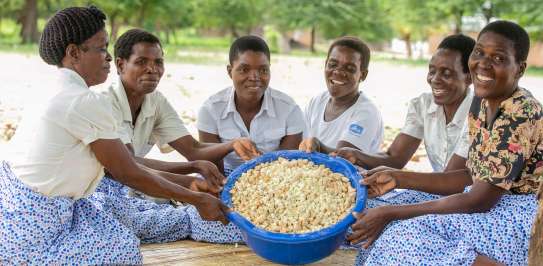In August 2005 I traveled with Christian Aid Ireland to Malawi. It was an unforgettable experience that has continued to linger and resonate with me over the years.
There we met with many farmers who had to face significant challenges to grow their produce. Lack of a clean water supply nearby meant they relied on rainfall. Lack of tools, such as a wheelbarrow meant that most of their work was tough on their bodies.
But for those few weeks in August 2005, I witnessed first-hand how Christian Aid Ireland made its impact. By supporting the work of local partners, we were able to bring farmers together, sharing information and advice. We were able to provide local training. Together they were stronger.
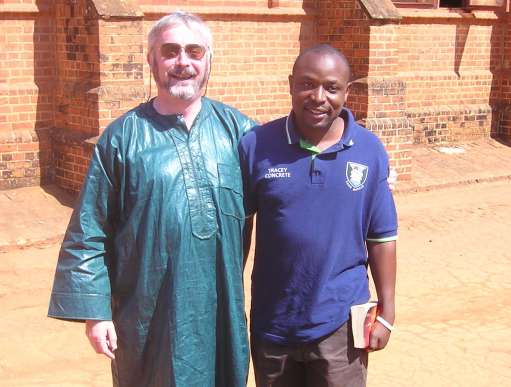
Life for women, in particular, was a struggle.
On August 11th 2005, my group travelled to the most remote villages and communities in the Mzimba District of Northern Malawi to visit water, sanitation and food security projects in villages and communities that were supported by the Christian Aid Malawian partner Central Church of Africa Presbyterian (CCAP).
In the village of Thurndira, in one of the remote communities in the district, we met people who were gathering at their water source. This traditional village water supply was an open-pit well, dug by hand into the soil, where women would have to wait for the water to fill slowly as it flowed into the pit. The water the women used, was a pale white colour, mixed with the clay soil, in my mind it was not fit for human consumption but still, it was gathered by these women to be brought to the homes and families in this village. The work was slow and hard.
Image credits and information
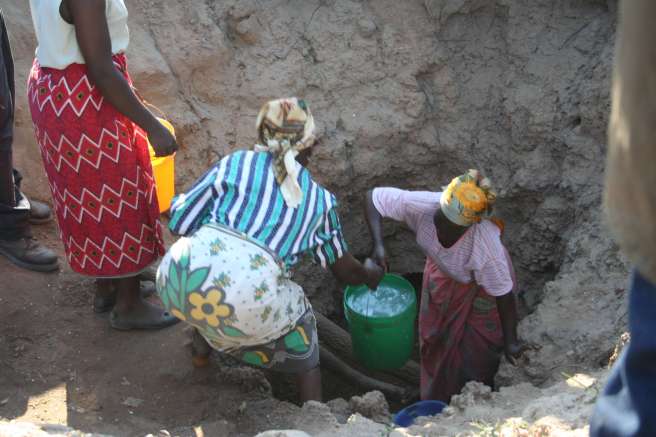
Speaking to the CCAP representative, Mabvutoe Lupwayi, he said they planned ‘to improve people’s access to clean domestic water through the construction and protection of shallow wells and boreholes and to build the capacity of the communities to utilise and maintain their water supplies.’ It was envisaged that this would be through establishing a proper water well and of a “Water Committee” where members would be trained in the use of wells and how best to maintain them for the whole village.
Christian Aid partner organisation CCAP had been working with communities like this for many years. Providing the poorest communities with access to clean drinking water. As a result of CCAP clean water programme there had been a significant reduction in water-borne diseases such as cholera and bilharzia, and it has also meant that women and young girls do not have to walk for kilometres to collect water every day. For children, this has allowed them to spend time in schools and education.
Image credits and information
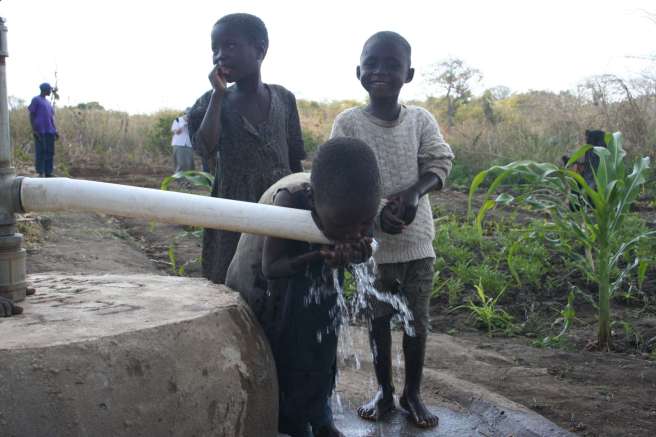
16 years later and, unfortunately, we can say that life for women, in particular, is still a struggle.
Today in Malawi, women are continuing to struggle in the face of the crippling climate crisis. Malawi is highly vulnerable to the impacts of extreme weather events. It was battered by Cyclone Idai in 2019 and many families lost everything. Since then, people have struggled to rebuild homes, pay for school and generate income. The climate crisis is causing extreme weather in Malawi, including massive floods and severe droughts, forcing people to look at new ways to earn a living.
Energy access is a major problem too; for small business to develop in Malawi, people need new sources of sustainable energy. For women’s groups, electricity is essential for processing their produce. Women in Malawi are hampered in business by a lack of training and an inability to access loans to develop their ideas. When they join together in women’s groups, they have more options, but these collectives need help to thrive.
In Malawi, a project is being implemented by Christian Aid and its partner Eagles Relief and Development. It helps women’s groups with investment and training and supports them to apply for bank loans to grow.
Christian Aid and Eagles have supported women’s groups to develop the building blocks for their success. They have been trained in a range of skills, one group now has a thriving fruit processing business, making baobab juice, while other groups produce dried fruit and vegetables.
Their profits are being invested into educating their children, housing, and their own businesses. This income is vital to building resilience to the climate crisis. With further support, they will continue to grow, working together to a bright new dawn.
Image credits and information
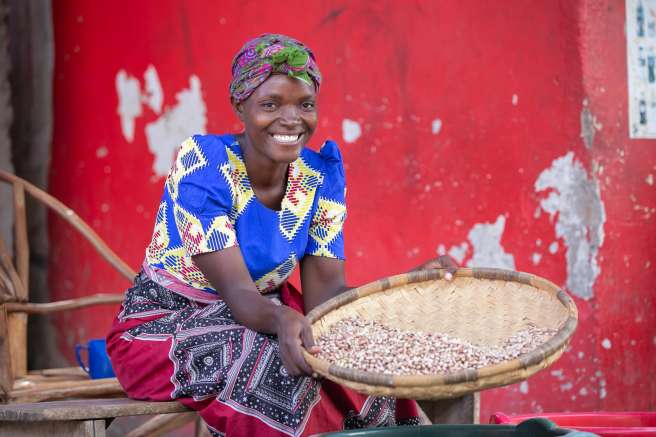
Janet Ben gestures at a pile of muddy bricks, all that’s left of her old house after Cyclone Idai swept through Malawi in March 2019. Her family lost everything they owned and their livestock was swept away. Homeless and only able to eat once a day, Janet was in a desperate fight for survival.
Hope came from an unusual fruit – and an amazing group of women.
In the massive baobab trees near her home, Janet points out the fruit, which look like fuzzy green rugby balls, high up in the branches. It’s this fruit that’s made all the difference to Janet and her friends in the Makande Women’s Group.
Janet knew that other women in her community had teamed up to improve their finances. ‘I used to admire women who were already members of this group,’ she says. ‘They were able to support their families.’
Joining the group has changed everything for Janet and her family. From the moment she joined, she felt love, friendship and a sense of community from other women.
‘I gave birth to my third-born child just months after joining the group. Guess what? The group showered me and my baby with many gifts, which was the first time I had experienced that since I got married. This was the turning around of my story,’ says Janet.
Image credits and information
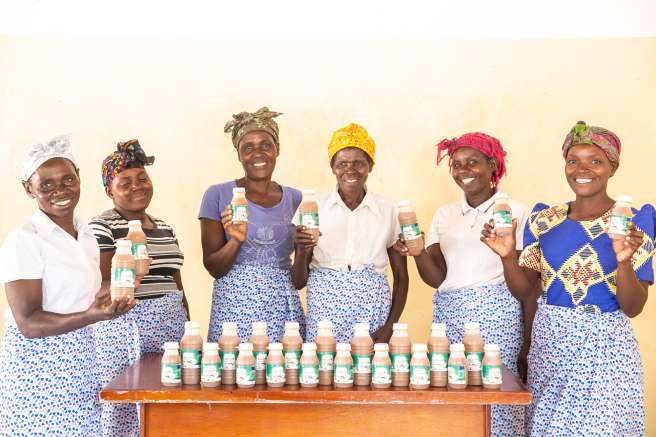
The women make juice from the baobab fruit, working in shifts. ‘Once we’ve made the juice, we take it to the market to sell. After selling we bring the money together,’ explains Janet.
Janet now has a reliable source of income from the juice and has opened her own stall at the local market.
‘My business is doing well and I have managed to save with the village bank. My two elder kids can now go to school on a full stomach.’
Her daughter Rihanna has great plans for the future and would like to become a nurse. ‘I want to be a nurse because I get inspired when I see them in their white uniform, which makes them look like great egret birds, and also when I see them helping patients.’
Janet would like to return to education too and train as a teacher.
‘The vision I have for my family is that we should no longer be poor. I want us to be a family that will inspire others.’
Watch Janet tell her own story.
The poorest and most vulnerable people are on the frontlines of the climate crisis, in particular women. They experience its worst effects through more frequent droughts, floods and storms. They are losing food, water, homes and family. Traditional ways of earning a living are lost and people quickly run out of savings, so they are hit even harder by the next disaster.
Christian Aid works with communities to promote new technologies, tools and training to equip them to adapt to the extreme weather conditions that threaten their lives.
Your support this Harvest could help more people like Janet find a way out of poverty and protection from the climate crisis. Your gift could help women join together to access start-up money, train them in the skills they need to run a business and access sustainable energy.
This Harvest, will you support people like Janet and her women’s group to take the next steps to a fruitful new life?
‘Two people are better than one, because they have a good reward for their toil. For if they fall, one will lift up the other’ Ecclesiastes 4:9-10
United, we can change lives. The seasons change, the years may pass, but love and community remain, strong and constant. Could you help more communities around the world build a new life, full of hope?
Your support can help bring more women together to access the money they need to get started. It can train them with the skills they need to run a sustainable business. And it can help provide the renewable energy needed to keep it running.
Let us stand as one with Janet and her sisters in Malawi, as they build a better life for their families together. Maybe you could give to help women’s groups around the world come together to build fruitful new lives. Or act to ensure our Government, joins with other countries to deliver strong climate justice at the COP26. And of course, pray for women in Malawi, that they may continue to lift each other up, and give thanks for their achievements.
We are stronger together. Join with us this Harvest and help more communities grow and thrive.
